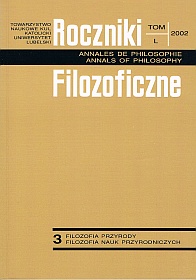Zagadnienie początku w filozofii średniowiecznej: geneza świata w ujęciach Księgi Pisma i Księgi Natury
Abstrakt
In the Middle Ages the problem of the beginning (genesis) of the world was studied inthe context of an analysis of the Book of Genesis. The Biblical text was interpreted in away that would be compatible with the reading of Plato's Timeus. The article focuses on two mediaeval thinkers, Eriugena and Thierry of Chartres, who conducted this sort of research.
Both Eriugena's Periphyseon and Thierry's treatise De sex dierum operibus belong to the genre of hexaemeron, that is commentaries on the Genesis. An analysis of early mediaeval hexaemerons provides an excellent opportunity to explore these keystone points of mediaeval culture which lie at the cross-roads of philosophy, science and biblical exegesis.
Bibliografia
Chadwick H.: Myśl wczesnochrześcijańska a tradycja klasyczna, tł. P.Siejkowski, Poznań 2000.
Dronke P.: „Theologia veluti quaedam poetria”: quelques observations sur lafonction des images poétiques chez Jean Scot, [w:] Jean Scot Erigene et l'histoire de la philosophie. Colloque du C.N.R.S. Laon − juillet 1975, éd. R.Roques, Paris 1977, s. 243-252.
Gilson E.: Historia filozofii chrześcijańskiej w wiekach średnich, tł. S.Zalewski, Warszawa 1966.
Jaeger W.: Wczesne chrześcijaństwo i grecka paideia, tł. K. Bielawski, Bydgoszcz 1997.
Jeauneau E.: Artifex Scriptura, [w:] Iohannes Scottus Eriugena. The Bible and Hermeneutics, ed. G. van Riel, C. Steel, J. McEvoy, Leuven 1996, s. 351-365.
Kijewska A.: Eriugena jako czołowy przedstawiciel renesansu karolińskiego, [w:] Studia z filozoficznej tradycji chrześcijaństwa, pod red. M.Manikowskiego, Wrocław 1998, s. 111-132.
Kijewska A.: Księga Pisma i Księga Natury. Heksaemeron Eriugeny i Teodoryka z Chartres, Lublin 1999.
Kijewska A.: Neoplatonizm Jana Szkota Eriugeny, Lublin 1993.
Kurdziałek M.: Jedność filozofii i teologii, [w:] Średniowiecze w poszukiwaniu równowagi między arystotelizmem a platonizmem, Lublin 1996, s.147-168.
Moreau J.: „Opifex, id est Creator”. Remarques sur le platonisme de Chartres, „Archiv für Geschichte der Philosophie”, 56(1974) 33-49.
O'Meara D. J.: The Concept of Natura in John Scottus Eriugena, „Vivarium”, 19(1981), No. 2, s. 126-145.
Parent J. M.: La doctrine de la création dans l'école de Chartres, Paris−Ottawa 1938.
Schrimpf G.: Die Sinnmitte von „Periphyseon”, [w:] Jean Scot Erigene et l'histoire de la philosophie, s. 289-305.
Steel C.: The Tree of the Knowledge of Good and Evil, [w:] Iohannes Scottus Eriugena: Bible and Hermeneutics, s. 239-259.
Weizsäcker C. F. von: Jedność przyrody, tł. H. Tomasik, Warszawa 1978.
Copyright (c) 2002 Roczniki Filozoficzne

Utwór dostępny jest na licencji Creative Commons Uznanie autorstwa – Użycie niekomercyjne – Bez utworów zależnych 4.0 Międzynarodowe.





